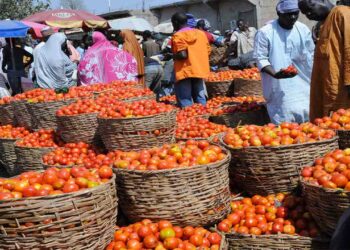As the fallout of spiraling economic lockdown around the world due to the ravaging coronavirus, economists are sounding the warning that the looming global recession could surpass the 2008 financial crisis. The 2008 financial crisis was a severe worldwide economic crisis dubbed The Great Recession and considered by many economists to have been the most serious financial crisis since the Great Depression of the 1930s.
Already, the impact of the scourge is beginning to take a toll on the Nigerian economy and the livelihoods of ordinary people. Restrictions on the movement of people in parts of the country are beginning to impair economic activities. In Lagos, schools have been ordered to suspend academic activities until further notice. Civil service is skeletal, and religious activities are restrained.
Similar measures are being adopted in Ogun State and the vast majority of the north. Coupled with a restriction on economic activities is the plunge of the price of crude oil, Nigeria’s mainstay, which is impacting the revenues of states.
At the federal level, the N8.5 trillion tax revenue target given to the Federal Inland Revenue Service (FIRS) seems to be a goose chase owing to the impact of Covid-19 on crude oil prices and other business operations across sectors of the economy. Already, businesses are shutting down; manufacturing production lines have been weakened. Union Bank Plc on Saturday announced that “Starting from Monday, March 23rd, Union Bank is activating remote work for all its employees except critical functions in our operations and service teams over the health and safety of its employees.”
Akwa Ibom, Bayelsa and Cross River with a total target of N2,175,116,159.19 target for January also had a low actual collection of N2,010,374,940.81 in the same month, representing 92.43 percent. Lagos Mainland East had a January target of N50,272,057,644.57 but its actual collection of N39,177,218,569.19 amounted to 77.93 percent.
Adamawa, Gombe, and Taraba had a January target of N1,496,937,795.22 but collected N2,237,217,349.37 representing 149.45 percent collection.
Jigawa, Kano, and Katsina had a collection target of N5,203,823,553.44. Their actual collection was N3,606,224,711.59 representing 77.93 percent. Ogun, Osun, and Oyo had a target of N6,268,435,732.91 while their actual collection during the period stood at N4,167,880,594.20 indicating 66.49 percent collection.
In like manner, Benue, Kaduna, and Niger had a tax collection target of N3,848,560,125.77, they made actual collection of N2,003,203,450.93 indicating 52.05 percent. Delta, Edo, and Rivers collectively had January target of N17,790,368,169.50 but recorded actual collection of N9,251,413, 039.13 indicating 52 percent.
Lagos state usually records the highest volume of tax collection among the States of the federation. But based on the available records from the State’s internal revenue generation, Lagos Mainland West was given a January target of N4,988,901,182.24 but collected N3,033,847,030.11 representing 60.81. Abia, Ebonyi, and Enugu had a target of N2,503,697,840.31 but they were able to collect N1,356,428,894.51 representing 54.18 percent.
Lagos Island was given a target of N459,548,646,637.50 in January, but it collected the sum of N238,708,658,042.72 translating to 51.94 percent. Bauchi, Plateau, Borno, and Yobe had a collection target of N2,793,435,123,22, but their actual collection was N1,446,670,932.56 indicating 51.79 percent.
The FCT, Nasarawa, and Kogi had the target sum of N61,680,175,079.81 but collected a total of N30,248,678,333.46 representing 49.04 percent. Ekiti, Kwara, and Ondo had tax collection target of N1,726,864,502.79 but ended up with actual collection of N757,471,765.95 representing 43.86 percent.
Whereas Sokoto, Kebbi, and Zamfara have a budgeted N1,457,022,041.29 tax figure for January, their actual collection was N532,837,594.78 indicating 36.57 percent while Anambra and Imo had target sum of N1,457,022,041.29, actual collection sum of N384, 986,673.78 reflecting 26.42 percent.
Three new cases of the #COVID19 have been confirmed in Lagos, Nigeria, taking the total number of confirmed cases in the country to 30.
The Nigeria Centre for Disease Control (NCDC), made this known on Sunday, noting that two of the cases are returning travellers while the other one is a contact of a confirmed case.
As the government makes frantic efforts to curb the spread of the virus, people have simply been advised to stay at home and limit their contacts with people.
While the Federal Government has shut down the Lagos and Abuja International Airports, several states such as Lagos, Ogun, and Kwara have banned large gatherings of more than 50 people.
The Lagos State government in addition to that, has announced a stay-at-home order for public officers from Grade level 1 to 12 for the next 14 days.
The former top economist to President Obama yesterday warned that the coronavirus pandemic could throw the economy into a tailspin that’s significantly worse than the financial disaster in 2008 — and believes its almost certainly in recession already.
In the past seven days, stocks continued their free-fall and recorded its worst finish since the financial crisis. The US Congress is scrambling to construct a colossal federal rescue package that may carry a price tag surpassing $1 trillion as economists warn layoffs are soaring and entire industries could be demolished in the fallout.
Businesses across the US have shuttered in a bid to slow the spread of infections. Around one in four Americans were urged to stay home Saturday, effectively freezing substantial economic activity.
There is a real danger that the economic crisis that comes out of this health crisis is worse than what we experienced in 2008. There is a complete shutdown of economic activity across the entire planet that happened in a synchronized fashion of a type we’ve never seen before.
Also, Emirates Airlines, one of the world’s largest aviation businesses, has announced suspension of all passenger flights from March 25.
The airline said Sunday afternoon its cargo operations would continue to provide critical logistics as the world battles to stymie the fury of COVID-19, an infectious disease caused by coronavirus.
“As a global network airline, we find ourselves in a situation where we cannot viably operate passenger services until countries reopen their borders, and travel confidence returns,” Emirates CEO Ahmed Al Maktoum said in the statement.
“By Wednesday 25 March, although we will still operate cargo flights which remain busy, Emirates will have temporarily suspended all its passenger operations,” the CEO added.
The airline said it would “continue to watch the situation closely” and be ready to resume operations once the situation returns to normal across the world.
The long-haul carrier, which operates more than 1,800 flights out of its main hub in Dubai every week,
In a related development, Chancellor Angela Merkel was on Sunday in quarantine after meeting a doctor who tested positive for the novel coronavirus, as Germany further tightens rules on public gatherings and plots a taboo-breaking package of support for Europe’s top economy.
News of Merkel’s potential exposure to the virus came minutes after she announced a ban on public gatherings of more than two people and further infection control measures.
“The Chancellor has decided to quarantine herself immediately at home. She will be tested regularly in the coming days… (and) fulfil her official business from home,” spokesman Steffen Seibert said in a statement.
Merkel had been slated to lead a cabinet meeting Monday to sign off on a 822-billion-euro ($882 billion) slew of measures to support Europe’s top economy through the shutdowns of public life designed to slow the infection’s spread.
A day after Singapore confirmed its first two coronavirus-related deaths, the country said it would close its borders to short-term visitors and some foreign labourers from 11:59pm (15:59 GMT) on Monday to help the limit the spread of the disease.
The new rules mean short-term visitors will no longer be allowed to enter or transit through Singapore, while semi-skilled workers on “work passes” will not be allowed to return to the island unless their job is in sectors that provide essential services such as healthcare and transport, the Ministry of Health (MOH) said in a statement.
National Development Minister Lawrence Wong told a briefing on Sunday the measures to “significantly tighten” Singapore’s borders had been prompted by the escalation of the COVID-19 pandemic around the world.
“In Singapore, almost 80 percent of our new COVID-19 cases over the past three days were imported, most of them Singapore residents and Long Term Pass holders returning home from abroad. These imported cases had travel histories to 22 different countries”, the MOH statement said.
Widely praised for its aggressive efforts to contain the virus without resorting to a total lockdown of the city, Singapore reported the country’s first deaths from the disease on Saturday.
The first was a 75-year-old Singaporean woman with a history of chronic heart disease and hypertension who had been in intensive care for 26 days since being admitted with pneumonia.
The other was a 64-year-old Indonesian man who was admitted to ICU on March 13, the day he arrived in Singapore from Indonesia and was confirmed to have COVID-19. Before he arrived in Singapore, he had been hospitalised in Indonesia for pneumonia and had a history of heart disease.
“I know Singaporeans will be worried and anxious. We must take courage and not give in to our fears”, Health Minister Gan Kim Yong told reporters on Saturday.



